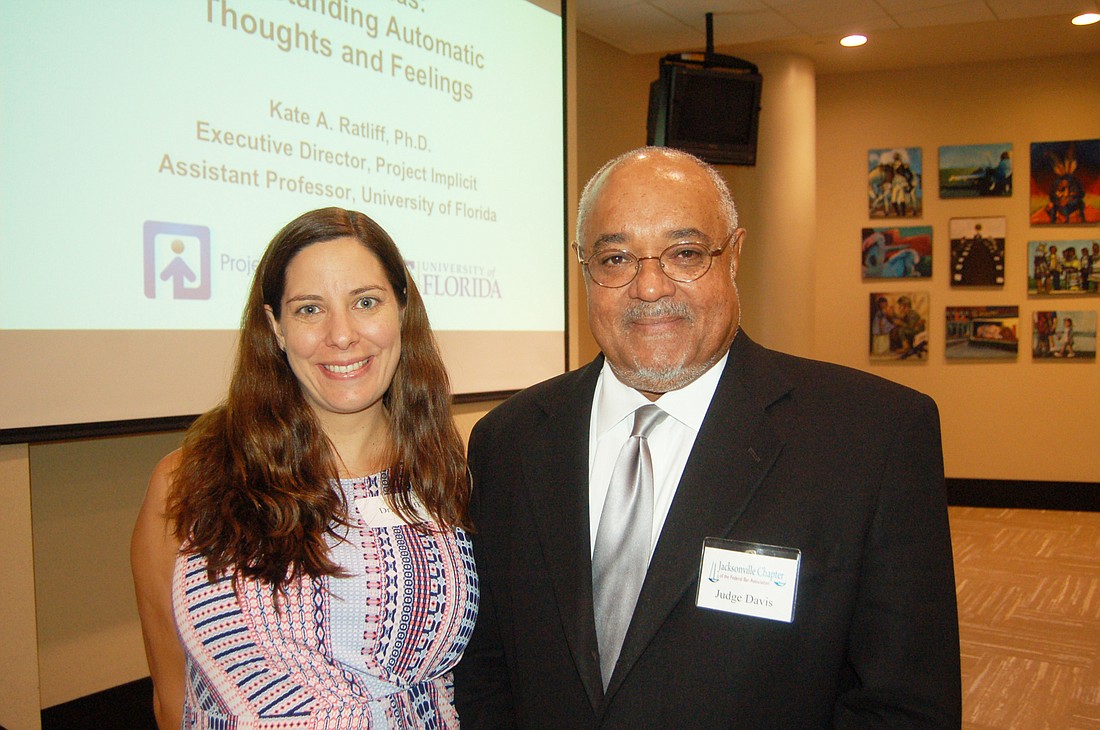
The topic for the Jacksonville Chapter of the Federal Bar Association’s CLE presentation Tuesday was “overcoming the impact of implicit bias,” so U.S. District Judge Brian Davis opened the program with a reminder for about 150 judges and attorneys gathered at the Bryan Simpson U.S. Courthouse.
“Equal justice under the law is so quintessential to our legal system that it’s chiseled into the portico at the Supreme Court,” Davis said.
The presenter for the event, which also was sponsored by the D.W. Perkins Bar Association and the Jacksonville Women Lawyers Association, was University of Florida assistant professor of psychology Kate Ratliff.
Since 2003, she has studied implicit bias – sometimes referred to as hidden bias. It’s manifested without the self-realization that it’s happening, because it’s unconscious and develops over a lifetime of exposure to attitudes and perceptions accepted by society.
Implicit bias can affect decisions, such as hiring and promotions, in business situations. In the courtroom, it can affect how juries might perceive litigants and witnesses and, possibly, how someone might be sentenced when found guilty.
Implicit bias is primal, based on how one person reacts to another person based on factors such as gender, race or sexual orientation. It’s much more subtle than what Ratliff called “explicit bias,” such as overt discrimination based on gender or race.
“Our perception is a construction of our environment. Past experience and learning influence what we see,” she said.
Ratliff gave as an example how two parents who leave work unexpectedly to care for their sick child could be differently perceived.
If it’s the father, he’s likely to be viewed as caring and devoted, but if it’s the mother, she could be perceived as letting her family life affect her career.
“In our social lives, we often see two things as very different even though they are the same,” Ratliff said.
Ratliff is executive director of Project Implicit, a nonprofit formed in 1998 to study thoughts and feelings that are outside of conscious awareness and control.
It operates an online “virtual research laboratory” that gathers about 3 million implicit bias surveys each year from people in 33 countries. The data is analyzed to identify trends in bias in basic perceptions.
Ratliff said in general, older people exhibit more implicit bias than do younger people; conservatives are more likely than liberals; and less-educated people are more likely to exhibit unconscious bias than those with more formal education.
One of the few studies of judges and how they presided in court showed that 86 percent of white judges and 44 percent of black judges showed bias favoring whites in their courtrooms – about the same level of implicit bias as both groups in the general population, Ratliff said.
She acknowledged, however, that little data is available on implicit bias in the legal profession.
“It is extremely hard to get judges and lawyers to participate in this kind of research,” Ratliff said.
While it’s not yet known how to eliminate implicit bias, Ratliff said research indicates certain situations that tend to increase its effect on decision-making.
When information is complex or incomplete, a decision is more likely to be affected by implicit bias. Decisions made too quickly and under stress also are subject to greater influence of implicit bias, she said.
Transparency is important, Ratliff added.
“Having to justify decisions to other people can reduce bias. Create practices with the idea that you have biases. Think about how you can work around the challenges of your work,” she said.
After Ratliff’s presentation, attorney Amber Donley, president of the D.W. Perkins Bar Association, said what she hopes will be taken away from the CLE is that unfortunately, “explicit and implicit bias does exist.
“But as keepers of the law, we must ensure that we mitigate implicit bias.” Donley said. “We must make a change in how we think and act.”
[email protected]
(904) 356-2466